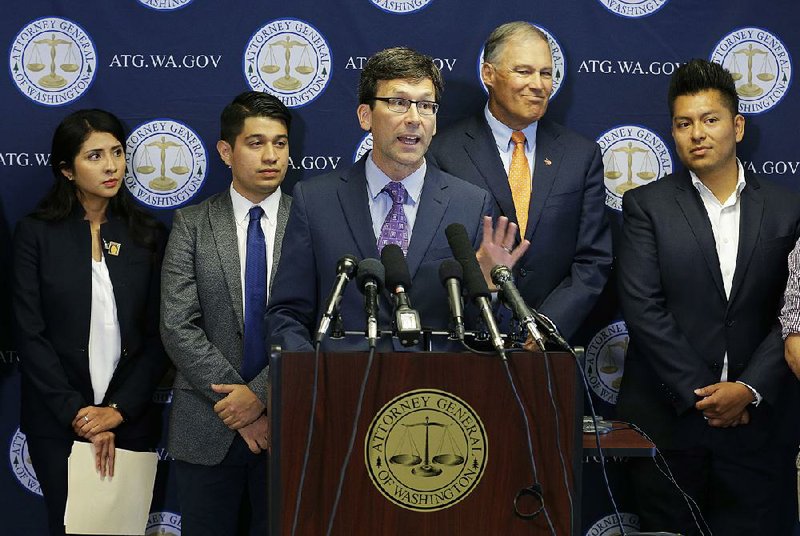NEW YORK -- Fifteen states and the District of Columbia sued the U.S. government Wednesday to block President Donald Trump's plan to end protection against deportation for young illegal aliens whom New York's attorney general labeled the "best of America."
The lawsuit filed in federal court in Brooklyn asked a judge to strike down as unconstitutional the president's action involving the Deferred Action for Childhood Arrivals program.
It called the move "a culmination of President Trump's oft-stated commitments ... to punish and disparage people with Mexican roots."
The attorneys general who filed the lawsuit, all Democrats, represent states where the population of program participants -- known as "Dreamers" -- ranges from hundreds to tens of thousands.
[U.S. immigration: Data visualization of selected immigration statistics, U.S. border map]
The program participants were brought to the U.S. illegally as children or came with families who overstayed their visas.
Trump's plan is "cruel, shortsighted, inhumane" and is driven by a personal bias against Hispanics, New York Attorney General Eric Schneiderman said.
He said the 42,000 New Yorkers with protected status under the program are largely model citizens. "They are the best of America," Schneiderman said.
"Dreamers play by the rules. Dreamers work hard. Dreamers pay taxes. For most of them, America is the only home they've ever known. And they deserve to stay here," he added, using the term that came from the never-passed DREAM Act [Development, Relief, and Education for Alien Minors Act] that would have provided similar protections.
[PRESIDENT TRUMP: Timeline, appointments, executive orders + guide to actions in first 200 days]
The suit cites a previous Trump statement referring to some Mexican immigrants as rapists as well as his decision to pardon former Arizona Sheriff Joe Arpaio, who was convicted of contempt for ignoring a federal court order to stop traffic patrols that targeted aliens.
Devin O'Malley, a Justice Department spokesman, said the agency looks forward to defending the administration's position.
Under Obama, Justice Department lawyers concluded in 2014 that the program is lawful.
Trump said Wednesday that he has "no second thoughts" about ending the deferred-action program.
"I'd like to see a permanent deal. And I think it's going to happen. I think we're going to have great support from both sides of Congress, and I really believe that Congress is going to work very hard on the DACA agreement and come up with something," Trump said, using the acronym for the program instituted by President Barack Obama by executive order.
The lawsuit filed Wednesday said rescinding the program will harm state-run colleges and universities, upset workplaces, and damage companies and economies that include people covered under the program.
"The consequence of the president's animus-driven decision is that approximately 800,000 persons who have availed themselves of the program will ultimately lose its protections" and be exposed to deportation, the lawsuit said.
Some legal experts, however, cast doubt on the strength of the lawsuit's claim of bias.
Pratheepan Gulasekaram, who teaches immigration and constitutional law at Santa Clara University School of Law, said the lawsuit will be hard to win.
"As a general matter, showing animus is not easy, especially showing animus on the basis of nebulous statements that don't necessarily reference this group," he said.
Kari Hong, an immigration expert at Boston College Law School, said she doesn't see the "litigation being successful in the same way as the travel ban," referring to the lawsuit earlier this year that limited the Trump ban involving predominantly Muslim nations.
In that legal battle, Hawaii argued that the travel ban was illegally motivated by religious discrimination against Muslims and used statements Trump made as a candidate to support that claim. A federal judge agreed and blocked the ban although the U.S. Supreme Court later allowed a version to move forward.
U.S. Attorney General Jeff Sessions said Tuesday that the deferred-action program will end in six months so Congress can have time to find a legislative solution for people in the program. Sessions, not Trump, publicly announced the phase-out of the program.
House Speaker Paul Ryan, R-Wis., said Wednesday that the program participants can "rest easy" knowing that Congress will take action to allow them to stay in the United States.
Ryan said Trump "made the right call" in rescinding the program because Obama had "overstepped his constitutional bounds," but he added that he was "encouraged by the fact that he gave us time to work out a consensus, to find a compromise" on the issue.
Under Trump's plan, people already enrolled in the program remain covered until their permits expire. If that happens before March 5, they are eligible to renew them for another two years as long as they apply by Oct. 5. But the program isn't accepting new applications.
Opponents of the deferred-action program said they are pleased with the Trump administration's decision. They called the program an unconstitutional abuse of executive power.
Washington Gov. Jay Inslee and Attorney General Bob Ferguson, both Democrats, called Trump's action cruel and outrageous at a news conference in Seattle announcing the lawsuit.
A half-dozen beneficiaries of the program -- young adults from Mexico, Venezuela, Peru and elsewhere, including some now working at law firms or for the state Legislature -- flanked Inslee and Ferguson at the event.
"It's outrageous, it's not right," Ferguson said. "As attorney general for the state of Washington, I have a hammer, it's the law."
Plaintiffs in the lawsuit are New York, Massachusetts, Washington, Connecticut, Delaware, District of Columbia, Hawaii, Illinois, Iowa, New Mexico, North Carolina, Oregon, Pennsylvania, Rhode Island, Vermont and Virginia.
Attorney General Xavier Becerra of California, which is one of the most solid Democratic states but did not join the lawsuit, said he plans to file a separate suit, noting that the state has a high number of program participants.
"The breadth and scope of the impact of the president's, I'd say, heartless decision is going to be felt here more than anywhere else," he said.
GOP DIVISIONS APPARENT
Despite Ryan's optimistic words, the deep divisions among House Republicans that have stymied past efforts on immigration were already on display Wednesday as lawmakers entered and exited a private House Republican conference meeting.
Ryan, who became speaker two years ago after promising that he wouldn't take an immigration bill to the floor without majority support from Republicans, began the day's meeting promising them the issue would be addressed "deliberately."
Rep. Steve King of Iowa, a hard-liner on immigration, rejected any move toward what he termed "amnesty" and criticized Trump for not ending the deferred-action program on day one of his presidency, as he had promised during the campaign.
"Why is this discussion taking place this way? Because he didn't want to make the decision boldly and distinctly," King said of Trump. "And instead it's kind of a King Solomon decision: cut the baby in half and throw both halves to Congress and let us fight over it."
What will actually happen in six months if Congress doesn't act remains unclear. In a tweet late Tuesday, Trump declared that if Congress can't act to "legalize" the program, "I will revisit this issue!"
Trump told reporters aboard Air Force One on a trip to North Dakota that he would "like to see something where we have good border security, and we have a great DACA transaction where everybody is happy and now they don't have to worry about it anymore."
Congress faces the debate four years after comprehensive immigration legislation passed in the Senate only to die in the House. And if the six-month deadline holds, it will occur in March -- just as primary season gets underway ahead of the November midterm elections and control of the House will be at stake.
At least one Senate Republican indicated that any legislative action on the issue was months away.
"I think most people view what has happened as an opportunity. But we also know tax reform has to take the front seat right now. We've got to stay focused on that," said Sen. Bob Corker, R-Tenn., referring to another key goal of the Trump administration to overhaul the tax system. "Six months gives us some time after tax reform to deal with that issue."
For their part, Democrats insisted that they would persist on the immigration issue by trying to attach legislation to unrelated measures if it's not otherwise resolved.
"I'd ask my friend the majority leader and Speaker Ryan to put a clean Dream Act on the floor of both chambers in September," Senate Minority Leader Charles Schumer of New York said.
Information for this article was contributed by Larry Neumeister, Gene Johnson, Sadie Gurman, Deepti Hajela, Karen Matthews, Andrew Selsky, Erica Werner, Catherine Lucey and Kevin Freking of The Associated Press; and by Mike DeBonis of The Washington Post.
A Section on 09/07/2017

